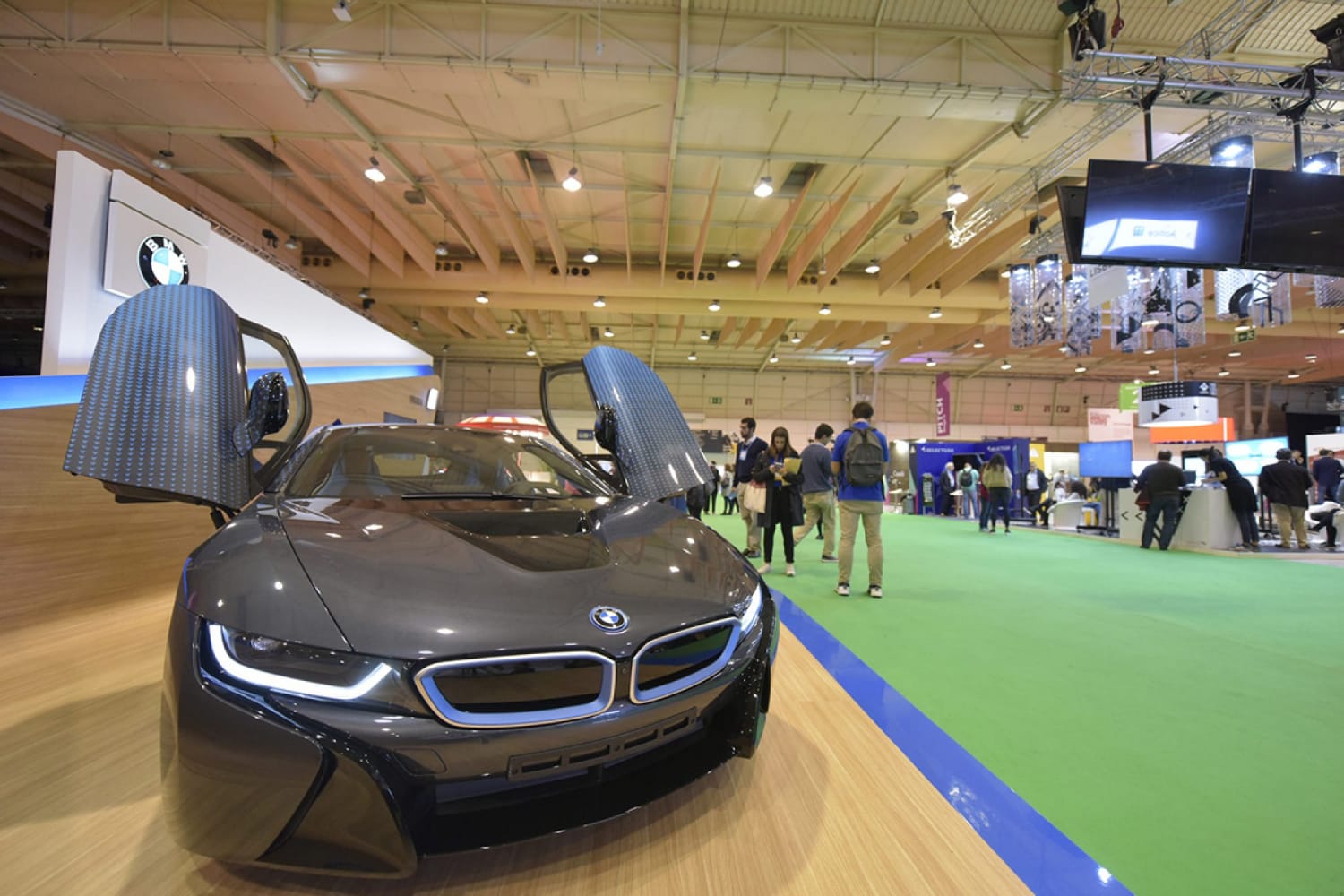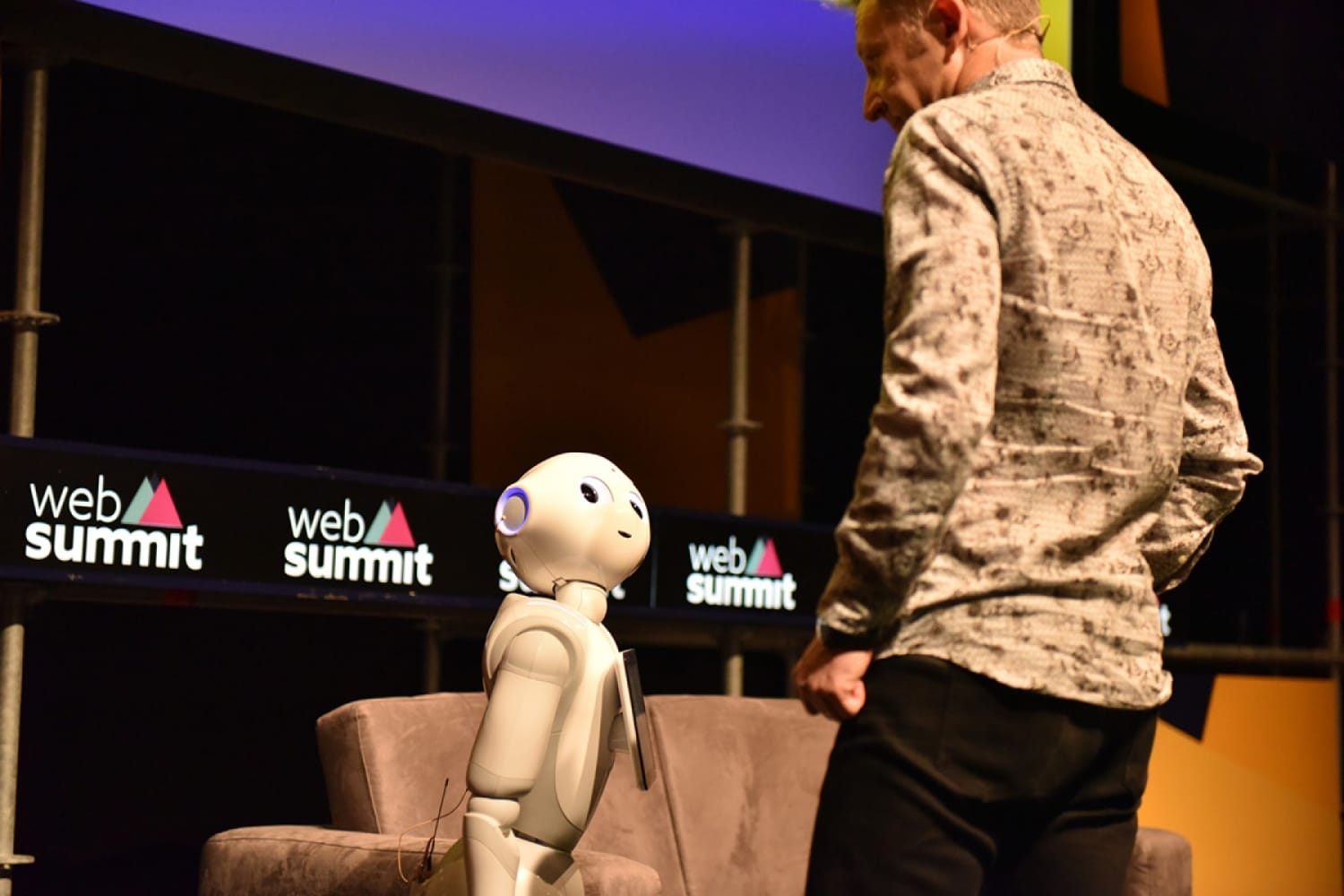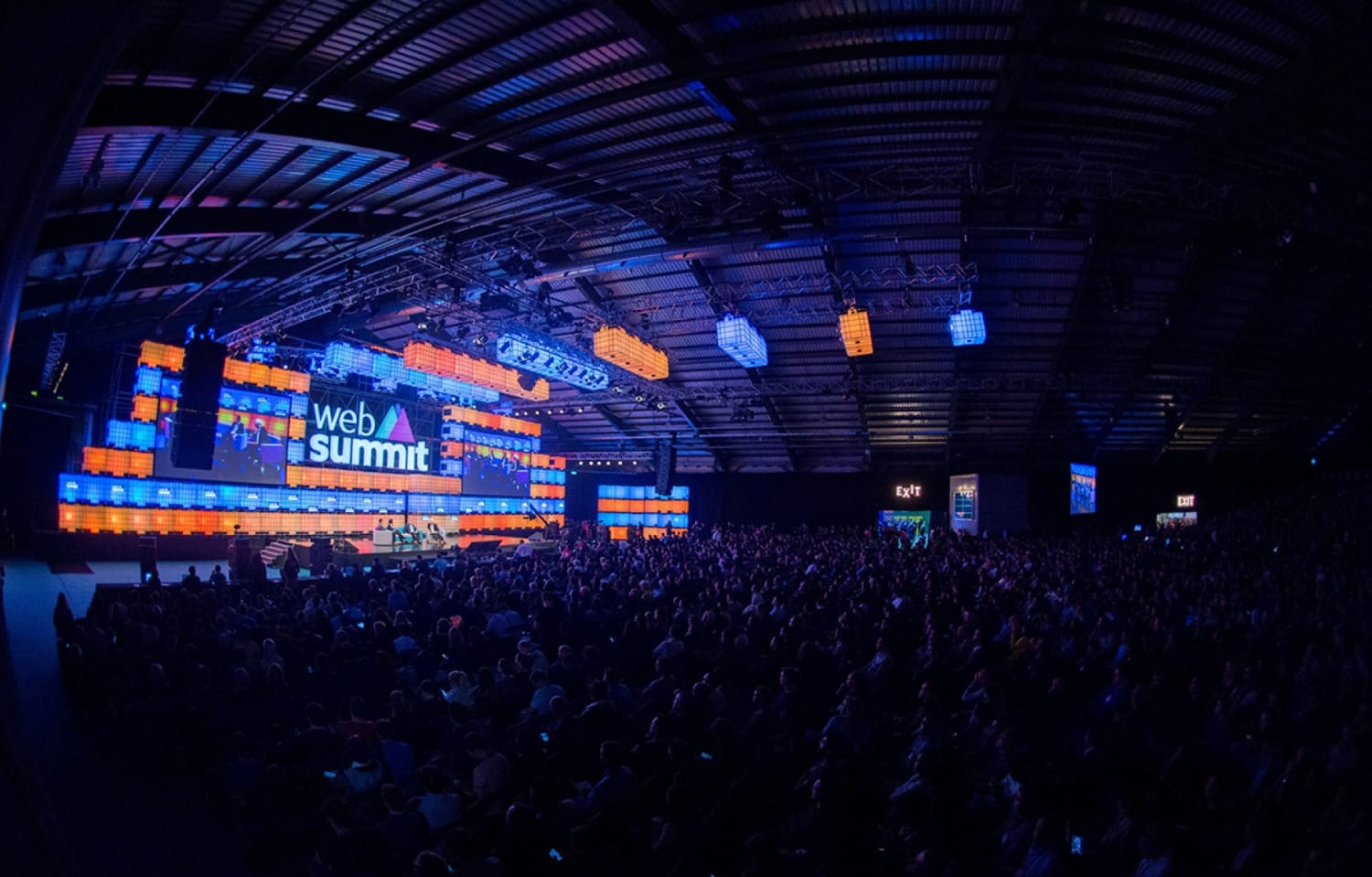Around the central stage, BMW showed off its automated cars and Estonian startup Starship Technologies showcased its droid delivery robots. Fully functioning robots were interviewed on stage, while coffee-making robots roamed the halls. Discussion was wide ranging, as usual. Chatbots, what do they mean? What is the future of advertising? How do you market to influencers? Is drone racing the new recreational sport? Why is FinTech the new industry to bet on?
Web Summit 2016 inevitably had a political edge, as the US election day fell in the middle of it.

And yet, as the results of the election came in, a feeling of unease around all this innovation and tech progress became apparent. “Artificial intelligence (AI) will destroy jobs and governments are not prepared,” concluded a survey of 224 global technology investors carried out at Venture, Web Summit’s premier VC event. The responsibility for the problem was placed with governments, rather than the tech firms these venture capitalists invest in. Of those polled, 53% agree that it is “inevitable that AI will destroy millions of jobs,” while the vast majority of investors (93%) say governments are not prepared for the impact of AI on jobs. A significant majority (82%) also believe that Britain’s exit from the European Union will damage Europe’s economy, and a similar number believe it will damage the prospects for British startups (77%).

The group had also bet big on the continued dominance of the Democrats. The poll found that 94% would have voted for Hillary Clinton and nearly as many, 89%, predicted the Democrat candidate was going to win.
Needless to say, the day after the US electorate chose Donald Trump, there was a fair amount of visible soul-searching among the VCs and tech luminaries on stage, bordering on an existential crisis in some instances about tech’s role in our lives and the impact that tech companies may have had on the election outcome.
“Technology has a role in that we provide communication platforms for the rest of the country and we’re allowing sh*t to happen just like cable news networks, just like talk radio,” said Dave McClure, founder of 500 Startups, in a much-publicized rant on stage the morning after the results. “It’s a propaganda medium and if people aren’t aware of the sh*t they’re being told … then yes, assholes like Trump are going to take office.” McClure said the tech industry had a responsibility to help avoid such outcomes, and called on the audience to stand up in protest. The video footage has since become a viral hit.
“It’s very possible to just see news that you want to see. As technologists we need to figure out a way to bring people together,” said Justin Kan, partner at Y Combinator. “We disrupt industries. Uber might be a great example. Self-driving cars are coming. That’s going to create a lot of job displacement. What are those people going to do? Are they going to become supporters of the next Donald Trump?”
McClure added: “We judge the leaders of countries and hold them up to certain value systems, morals and ethics. But the people who run some of the largest companies probably have larger populations of users than many countries. I don’t think we’re holding those folks up to the same level of standards. Maybe that’s something we need to start looking at.”
Even the most hard-nosed tech evangelists and VCs expressed concern. Steve Anderson, founder of Baseline Ventures, talked of concern over new investment in automated kitchen equipment, potentially making certain low-skilled workers redundant: “I don’t have the answer but I want to be part of the solution. It’s a responsibility all technology companies should take.”
Facebook, which has taken over from Google as the primary driver of traffic to media platforms, also came under scrutiny, not only at Web Summit but also in mainstream news, for creating filter bubbles by personalizing news feeds. The conclusion of many at Web Summit is that Facebook is becoming a media company and should face the same responsibilities and regulation.
On November 8, Juan Branco, Julian Assange’s legal advisor, discussed WikiLeaks on the Future Societies stage. Shortly afterwards, Branco released a statement from Julian Assange on the US election: “In recent months, WikiLeaks and I personally have come under enormous pressure to stop publishing what the Clinton campaign says about itself to itself. That pressure has come from the campaign’s allies, including the Obama administration, and from liberals who are anxious about who will be elected US President. (…) It would be unconscionable for WikiLeaks to withhold such an archive from the public during an election. At the same time, we cannot publish what we do not have. To date, we have not received information on Donald Trump’s campaign (…) This is not due to a personal desire to influence the outcome of the election. (…) We have endured intense criticism, primarily from Clinton supporters, for our publications. (…) Wikileaks remains committed to publishing information that informs the public, even if many, especially those in power, would prefer not to see it. WikiLeaks must publish. It must publish and be damned.”
Web Summit and its parent company umbrella events are rapidly expanding, despite the crowded landscape of thought-leadership events, summits and conventions across the globe. The move from Dublin to Lisbon (after disputes with the Irish authorities) hasn’t held back its flagship event. This year saw more than 53,000 attendees from 166 countries; 15,000 companies, 7,000 CEOs and over 2,000 international journalists attended. The sprawling 2016 event had 24 themed stages and platforms, from MoneyConf (analyzing FinTech) to Creatiff (aimed at the design industry) to Future Societies.

New Platforms—New Money
One emerging theme was how traditional industries such as publishing and music can monetize when “content” is increasingly expected free and on demand. Till Faida, CEO of Adblock Plus, was pitted against Cait O’Riordan of the Financial Times and Bloomberg Media CEO Justin Smith. Adblock, one of the most popular ad-blocking companies, has recently been experimenting with micropayments; consumers pay only for media they use. He was greeted with cynicism, not least by O’Riordan, who described the quality of the Financial Times experience, the need to control it, and also how the paywall now meant it was less dependent on advertising.
Music, another area of disruption in this respect, was also under the lens, and questioned for not allowing artists to gain adequate compensation. While technology has changed and advanced, legislation has not, complained musical artist Ne-Yo, adding that artists were not being paid fairly for work. While agreeing that musicians are not properly compensated, fellow musician Tinie Tempah pointed out the benefits of YouTube and platforms like Spotify and SoundCloud, arguing that it means it’s never been easier for unknown artists to gain a following and succeed: “Everyone has a shot at becoming a big star.”
SoundCloud exec Eric Wahlforss said that new platforms offer artists and labels significant amounts of consumer data to further inform their business, so they know who their audience is and what that audience is listening to. He also pointed out, as the Innovation Group has noted for some time, that, like it or not, generation Zers and young millennials are shifting expectations and behaviors, potentially irreversibly, when it comes to media consumption habits. Adapt or die…
Attention Economy
In our forthcoming Future 100 report we discuss the notion that quality attention, not clicks or page views, is the true value in media. Gary Vaynerchuk, CEO of VaynerMedia, drove home this sentiment in his keynote address: “We have an enormous, and I mean enormous, overestimation of what mainstream media and traditional communication platforms are worth, and a gross underestimation of what’s happening in the worlds that we’re all looking at. There are hundreds of people right here, right now, filming me live. That technology would have cost thousands of dollars just 10 years ago… Communication has been completely shifted forever,” said Vaynerchuk.
Our current most important asset, he said, is time. Advertising, which he refers to as “stealing somebody’s time,” is thus “dead.” Arguing that bad pop-up mobile ads are not the answer, he observed that “not all impressions are equal. Not all press is good press”—bad click-throughs annoy and alienate audiences. “There’s still $80 billion spent on TV,” said Vaynerchuk; but most people now watch TV on their own time, not live. “How many people now watch live TV outside live sports? How many people, given the option, fast-forward every single commercial? It’s about attention.” Mobile, he says, is where attention is now focused. “Mobile is now the TV. The TV is now the radio. Facebook, Instagram and Snapchat are ABC, NBC, BBC and Sky. Whether you’re a startup or a B2B or an entrepreneur or a corporation you need figure out how to make the best shows on those networks.”
A Bold Future
Outside of the election, a striking number of prescheduled talks also addressed the relationship between technology and government. Some panels, mainly made up of prominent US VCs, exhibited the confidence we’ve come to expect from Silicon Valley. The central question: “To what extent do we think entrepreneurship will solve all world problems?”
“The cost of going to the Moon is $7 million. I believe it will be $2 million in future,” said Naveen Jain, founder of Moon Express, part of NASA’s Lunar Catalyst project, which is working towards commercially viable lunar landers. “You’ll be able to go to the moon for a day. Private industry is going to do this. Not Germany. Not France. Not the United States.”
Hyperloop unveiled its latest plans to collaborate with the United Arab Emirates on a high-speed link between Dubai and Abu Dhabi. Hyperloop One is taking on a more civic tone, promising to reinvent transport as we know it (Uber is also publishing white papers on the future of public transport). Shervin Pishevar and Josh Giegel, cofounders of Hyperloop One, held a press conference showing a futuristic video of what a day in the life of a Dubai-based exec might look like, jumping on Hyperloop One and arriving in another city in record time. Pishevar, also MD of Sherpa Capital, envisages Hyperloop One connected to a bigger transport ecosystem in cities, collecting people from their location on demand. Hyperloop One says it plans to show off the full-scale prototype it’s building in Nevada in 2017.


Elsewhere, tensions between entrepreneurship, tech, innovation and government were discussed. Topics included “government and entrepreneurs, a marriage made in hell?”
A session called “The filter bubble versus democracy” featured Ann Mettler, head of European political strategy at the European Commission, while “Should the internet be a safe place?” featured Salil Shetty, secretary general at Amnesty International. The title of the “Will technology kill democracy?” session perhaps sums up the essence of the debate.
Keynote speaker Saul Klein, general partner at LocalGlobe, touched on, among other issues, how technology companies, having previously focused on sectors such as communication and entertainment, are now moving into non-discretionary industries, spelling displacement for major companies in this segment. (On cue, it has since been reported that Tesla Motors shareholders have approved a merger with solar energy installer SolarCity Corp, effectively giving Elon Musk, Tesla CEO, a stake in the US energy industry.)
At the conclusion of Web Summit 2016, attendees emerged with a new US president-elect in place. The implications for tech, automation and Silicon Valley are unclear, but at Web Summit there was a growing sense of self-examination. Perhaps the only clear conclusion is that the tech landscape, in the United States at least, might change considerably as 2017 plays out.
Please provide your contact information to continue.
Related Content

The Future Shopper 2025: Key trends shaping e-commerce

